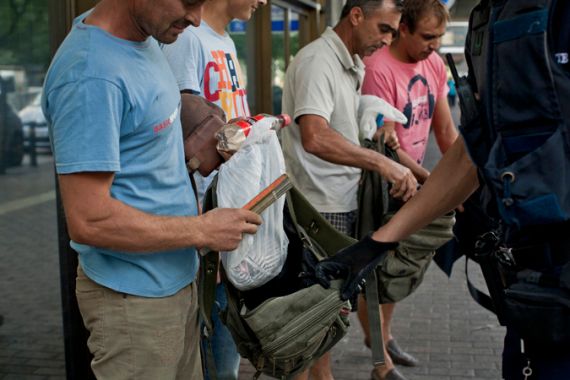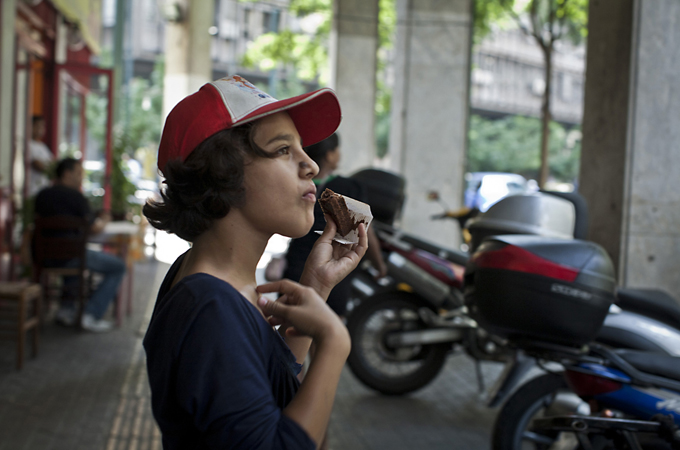Golden Dawn glows amid Greece gloom
Rising unemployment on the back of financial crisis allows far-right party to win supporters by targeting immigrants.

Athens, Greece – The Athenians of Amerikis Square are in no doubt about it – Golden Dawn, the far-right nationalist party many describe as neo-fascist – is to be thanked for cleaning up their neighbourhood.
“Immigrants used to just rob you. But in recent years they were also beating you up,” says Katerina, a florist who has worked on the square for nearly two decades.
“They camped on the square. They would relieve themselves in plain view. They were constantly fighting amongst themselves. I don’t want to go home every evening wondering if I’m going to survive the wait at the bus stop,” she says.
Katerina narrates how Africans mugged a fellow shopkeeper two doors away while she was opening her clothing boutique one morning. Some of her elderly clients say they have been mugged after picking up their pensions at the bank.
About a year ago, people started to call members of the Golden Dawn to escort them to the bank or to break up fights among immigrants.
“Things have improved a lot since then,” says Katerina, who didn’t wnt to use her full name. “The first phone number people call is no longer the police. It’s Golden Dawn.”
Hot political issue
Immigration has become a hot political issue during the four years of Greece’s financial crisis, especially when linked with unemployment.
One in four workers is now jobless as 18.4 per cent of the economy has evaporated. Felonies have tripled in the past two years, compounding both economic and physical insecurity.
Almost solely on the issues of crime and immigration, Golden Dawn managed to win seven per cent of the popular vote in elections last June, taking 18 seats in parliament. Its appeal has since grown, recent opinion polls show. There is a public perception that the party fills a law-enforcement vacuum.
But Greece’s migrant organisations see Golden Dawn differently. They say it is taking the law into its own hands, and they suspect police collusion.
“Before, there were only ugly words. Now they are on the point of killing people,” says Javed Aslam, an elected leader of the Pakistani community since 2003.
|
Greece cracks down on illegal immigrantion |
“There are two separate laws. The police leave the fascist alone, and if a foreigner does the slightest thing he goes to jail,” he says.
Asked if the state has turned a blind eye to harassment of migrants, Aslam says: “It is clear that practically they don’t stop them.”
The watchdog 1 Against Racism says vigilante groups in central Athens neighbourhoods like Amerikis Square are responsible for 87 reported violent attacks on migrants in the first nine months of the year. It calls these reports “the tip of the iceberg”.
“Most of the attacks are perpetrated by groups… they approach migrants in public places, usually at night, ask them where they’re from and then attack,” the group said in a report released this week.
“In some cases the victims or witnesses said the perpetrators were members of Golden Dawn, either because they carried the party’s emblems or because they were recognised from other party events in the same area.” Golden Dawn’s symbol is a right-angled meander bearing a strong resemblance to the swastika.
The watchdog says 15 of its reports concern mistreatment in police stations, such as “humiliating behaviour, prolonged detention or destruction of official documents.” None of the reports have resulted in a prosecution.
Aslam sees the increase in racist violence as inseparable from a new government policy to detain and deport illegal migrants. This marks a departure from two decades of low-maintenance laissez-faire immigration policy.
For years, undocumented migrants would be given a dated chit and asked to depart Greek soil within three months. Then they were simply released. If they were arrested after that, the process was repeated with a new chit and a new date.
In effect, authorities were allowing the market to decide who stayed. This meant that most immigrants lived off the grid. They paid no taxes or social security and created a black labour and consumer economy.
Collapse of shadow economy
Greece’s economic collapse has also meant the collapse of this shadow economy. Unemployment led many to crime, creating an impetus for Golden Dawn. Sensing voter’s growing fascination with the right, the newly elected, conservative-led government started police sting operations last August. Illegal migrants are now taken by bus to detention camps far from city centres.
Police may detain them for six months before deporting or releasing them.
Aslam believes the policy has simply cast a cloak of terror over everyone. “They want to terrorise those who are here.
“Do you think it is the illegals who have been hurt? Not more than a few.” He says illegals have gone into hiding while the more visible, legal residents absorb the harassment.
Police spokesman Christos Manouras sees it differently. “We have cleaned up the city; Athens has become more humane, there is a different quality of life and people are saying so.”
 |
| Illegal migrants are now transported to detention camps far from city centres [Anna Psaroudaki/Al Jazeera] |
He sharply distinguishes legal from illegal aliens. “The legal immigrant has a right to life and to the society he migrated to. He is assimilated into society, he is accepted by everyone. We consider him a moral extension of ourselves and embrace him.”
The ruling conservatives have tried to distance both themselves and the state from Golden Dawn’s actions.
Public Order Minister Nikos Dendias stripped the party’s MPs of their police bodyguard last month, after one of them smashed unlicensed vendors’ stalls at a local farmers’ market with his police escort present.
A few days later, at the government’s behest, Greece’s Supreme Court issued a circular instructing police that parliamentary immunity did not protect deputies from arrest when they committed a felony, such as violent assault.
Discrimination may be more insidious than outright thuggery. Pastor Jimoh Adebayo has for two decades held his ministry on the fringes of Amerikis Square.
He says implicit racism runs through Greece’s immigration bureaucracy. “They say bring this paper, then the next day they say bring something else,”says Jimoh. “Almost every officer in all the departments seems to have their own interpretation of the law.”
This Kafkaesque treatment has kept many migrants in limbo. But if it was meant to discourage, the dysfunctional Greek immigration process has backfired.
Legal hiatus
Economic migrants posing as refugees flooded the asylum pipeline with spurious applications, overwhelming it for years and giving themselves a legal hiatus as temporary residents.
Greek authorities responded by treating all applications as suspect. Between 2006 and 2011, Greece received 89,575 asylum applications.
It has approved 929. There is still a backlog of some 45,000.
Greece has earned itself international opprobrium for failing to filter those with genuine fear of persecution for race, religion or political beliefs.
“Many Syrians right now don’t want to apply for asylum, because they know that the system does not work,” says Petros Mastakas, an officer for the United Nations High Commission for Refugees in Greece.
“They try to smuggle themselves to other European countries, while others who are not entitled to asylum do apply in order to extend their stay in Greece.”
Greece is in the process of staffing a dedicated asylum service that bypasses regular immigration police. “We are about a month and a half away,” Christos Manouras, police spokesman, says.
Greece has had more than its fair share of migration flows, perched as it is on Europe’s southeastern corner. It saw a flood of economic migrants from Eastern Europe when the Iron Curtain fell on its northern border in 1990. More recently the Aegean archipelago has become traffickers’ preferred point of entry into Europe, swamping Greek authorities.
More than 600,000 arrests over the past five years have led to only 182,000 deportations.
The few thousand now in detention do not suggest that police are capturing anything approaching the balance. So at the end of the day, the economy seems to determine the fate of migrants more than the new immigration policy or Golden Dawn’s shenanigans.
“We are now half or a quarter of what we used to be,” says Pastor Jimoh. His congregants, mostly factory or farm labourers, have voluntarily moved on to northern Europe. A fraction returned to Nigeria and Sudan. Golden Dawn has played little or no role in this.
“More than 90 per cent of the people are very, very kind and hospitable,” he says.